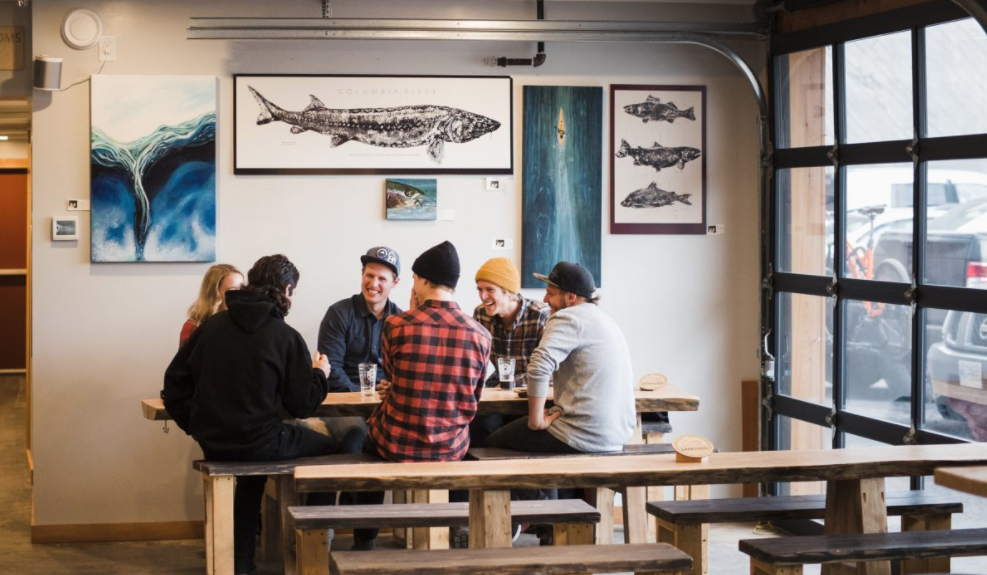
Local brewers craft for community
You are sitting at your favourite bar in town watching the bartender pour that familiar winter ale that always signals the beginning of ski season. As you wait for them to slide that frosty mug of beer down your direction, you probably aren’t thinking about hop farmers, or the ways the brewery is trying to cut back on water consumption, or what happens to all the grain at the bottom of the fermentation tanks.
This article by Sarah Beauchamp was originally published by livinghere.ca.
For Hedin Nelson-Chorney, owner of Tailout Brewing in Castlegar, British Columbia, he knows all too well that beer and the environment go hand in hand. As a former employee of Parks Canada, with a Masters degree in Conservation Biology, Hedin has a deep understanding of the importance of treating the land well.
“Hops are the lifeblood of beer,” he says. Land and beer are intertwined.
Hedin does his best to buy hops from B.C farmers, however, Canadian hop farmers face so many obstacles. While western Canada is known as the grain belt of North America, British Columbia is just starting to obtain more proprietary rights over hops. Today, pricing and trademarks are the biggest challenges for farmers here in this region; it is difficult to compete with American growers who are able to offer such a wide range of trendy hop varieties. If there were more incentives to buy locally, such as tax breaks for brewers who use locally grown hops, people like Hedin who are just starting out in the brewing industry would be in a better position to support local industry.

One of the core values for Tailout Brewing is community and Hedin tries to focus on how they can support local business. Hedin and his partner Mary Lusty, who is also Tailout’s head brewer, moved to Castlegar for its small town charm and its incredible landscapes. Hedin wants his brewery to be the hub of the community, a place for people to enjoy beer responsibly, while getting out there to experience some of the best outdoor living British Columbia has to offer.
“We are so lucky to be living here in the Kootenays,” he says.
This is one of the reasons why he started the Mug Club, a membership program that gives participants special discounts on merchandise, growler fills, as well as special events and member parties. This year they hosted a Fly Fishing Film Festival in their tasting room. Each member even receives their own custom mug designed by a local potter. Hedin sees the brewery as a space to engage the community in meaningful ways. For Tailout Brewing the goal is simple: they just want to bring people together.

The popularity of craft breweries has exploded over the past ten years. Each small community here in British Columbia seems to have their own microbrewery, and although you would think this would make the brewing industry competitive between towns, Hedin has experienced quite the opposite.
“There are good relationships back and forth between all the brewers here,” he says.
Trail, Rossland, Salmo, and Castlegar now all have their own breweries; in Nelson there are three microbreweries currently operating, including Nelson Brewing Company, which is fast approaching their 30th anniversary.

Simon Barna has been with NBC for seven years, acting as the head brewer for the last three. Having spent his youth working at the Kingston Brewery, Simon was grateful for landing the position with Nelson Brewing Company, who even paid for him to attend brewing school.
“Local breweries have always been the cornerstone of community,” he says. From sponsoring neighbourhood sports teams to partnering with local charities, NBC’s core values include giving back to the place they call home. Another value: supporting organic agriculture.
In 2006, NBC decided to transition the brewery to fully organic to better reflect the values of their community. This means that they pay up to 45% more for their products while adhering to numerous rules and regulations, including surprise organic inspections to maintain their certification.
“It is an added expense, but that certification is important for the company,” Simon says.

Photo by Sarah Beauchamp.
Ten years ago, it was almost impossible to obtain organic malt. Today there is a lot more research going into barley and hops growing, which is exciting for the agricultural side of brewing. With the popularity of microbreweries, there is a lot of potential for B.C hop growers to prosper. For NBC, maintaining relationships with organic hop farmers here in our province is something they value.
Just like Hedin at Tailout Brewing, NBC is also very mindful of their environmental impact. Brewing creates a lot of waste, and the team tries to use as much of their green waste as possible. Their leftover grain goes to farms in the community; their protein and hop matter creates a nitrogen that is excellent fibre for compost soils. They even installed an ozonator to avoid the use of industrial sanitizers full of unwanted chemicals.
However, Simon says their biggest win of the year was being able to save on water consumption. This year the brewery was able to upgrade their heat exchanger, which allows them to trap hot water and use it to brew the next day. Brewing requires a lot of water, so this has been a game changer for their team, and another step closer to crafting beer in more sustainable ways.
Brewers like Hedin and Simon are finding innovative ways to craft beers with sustainability, community, and environment in mind so that we may carry on enjoying pints of our favourite hops and barley. Our local breweries craft with their community in mind.

